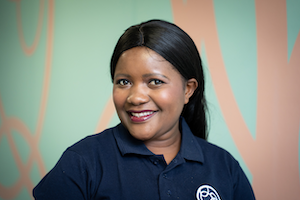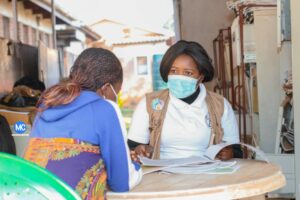On International Day of the Girl: The New Face of HIV
 “Growing up, I always felt different. I had to take pills every day. No one would tell me why, and I would often hide or throw them away when no one was looking.
“Growing up, I always felt different. I had to take pills every day. No one would tell me why, and I would often hide or throw them away when no one was looking.
Two years ago, I became very sick. I will never forget the day I found out that I had been born with HIV and that those pills were lifesaving antiretroviral treatment. This was very difficult for me to process and I missed a lot of school.”
– Josephine Kalombola, mothers2mothers (m2m) Peer Mentor in Malawi.
International Day of the Girl
Today is the 10thAnniversary of International Day of the Girl—a day designated by the United Nations (UN) to raise awareness about the challenges girls face around the world. At m2m, we are shining a light on how adolescent girls and young women (AGYW) are disproportionately impacted by HIV.
In fact, adolescent girls and young women, like Josephine, are the new face of HIV across sub-Saharan Africa. This vulnerable population is now three times more likely to acquire HIV than their male peers. Profound gender inequities make it harder for them to access health care, education, and economic opportunities. This ultimately deprives them of control over their future, and leads to heightened risk of teenage pregnancy, child marriage, and HIV infection.
With UNAIDS reporting that an adolescent girl will be infected with HIV every two minutes in 2021, it’s clear that the global HIV/AIDS response is in danger of leaving adolescent girls behind—and that’s unacceptable. But there is hope, if we support the women closest to the problem to lead the solution.
A part of the solution
At m2m, that means employing local women living with HIV as community health workers to provide health services, education, and support to women and families in their community. Since we know that the most accessible services are delivered by peers, our adolescent-focused services are provided by younger peer mentors. These young women provide proven, age-appropriate sexual and reproductive health education and services so that their AGYW clients can make informed decisions about their health and future.
Fortunately, Josephine had m2m Mentor Mother Thoko to help her through her health challenges. Thoko would not give up on her. She supported Josephine to come to terms with her diagnosis, stay on treatment, and get her life back on track.
Now Josephine is paying it forward—providing health services, sexual and reproductive health education, and support to other girls and young women in her community as an m2m Peer Mentor.

Jospehine with a client in Lilongwe, Malawi.
“By sharing my story, I bring hope to my clients. I may be a young woman living with HIV, but I am healthy, I am accomplished, and I am happy,” Josephine says.
Our impact
Providing adolescent-focused services is a priority for m2m and we are scaling up rapidly. In the first half of this year alone, Peer Mentors such as Josephine, reached almost 200,000 adolescent girls, ages 10-19—exceeding our target for the full year and bringing home how in-demand services are for this age group. m2m plans to continue to grow our efforts to support more AGYW by tailoring services and recruiting younger peer mentors to ensure that these young people receive the critical services they need, and help them achieve a healthier and brighter future for themselves and their families.






















